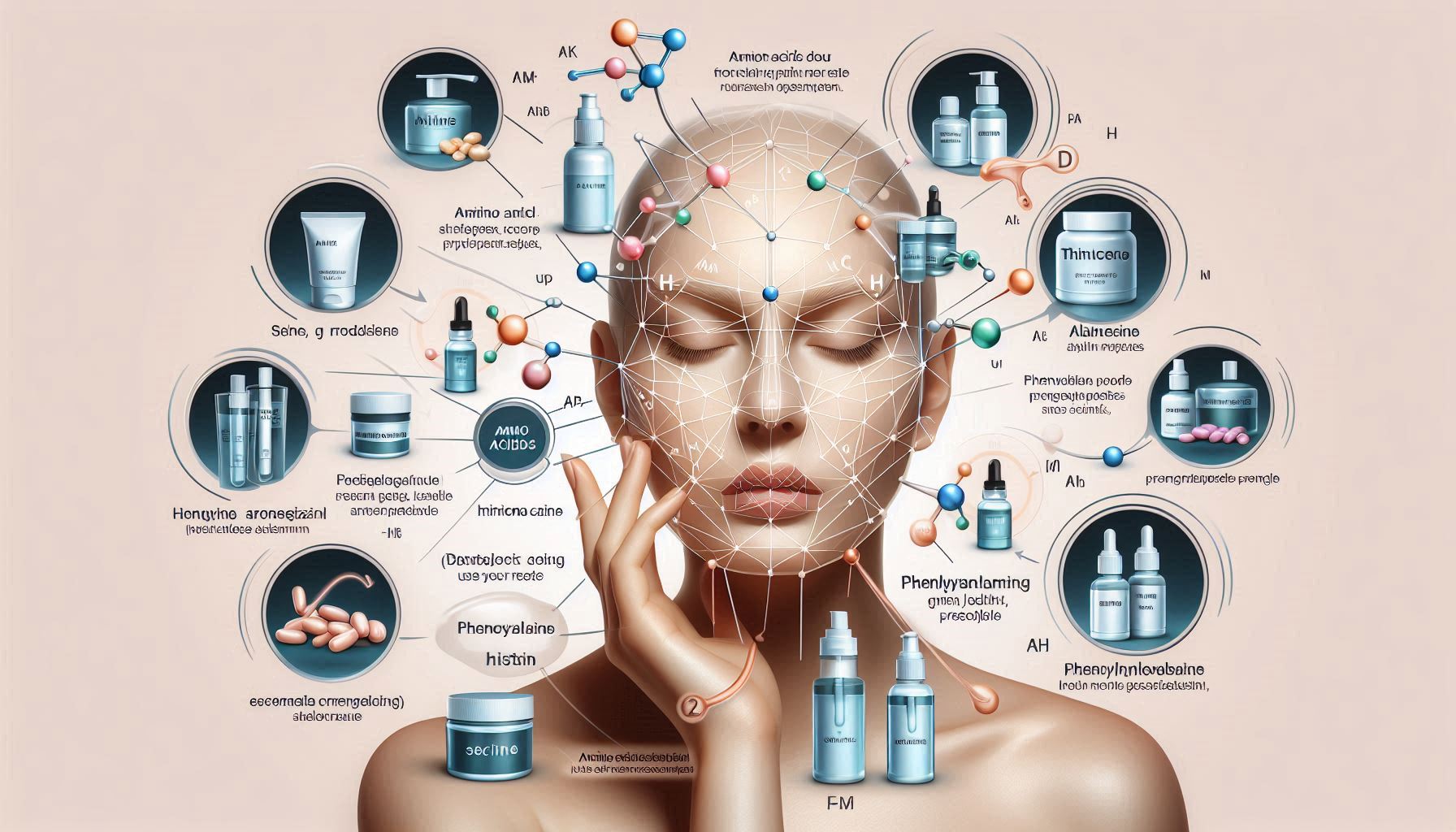
Why do we use Amino Acids (Serine, Glycine, Alanine, Proline, Threonine, Valine, Isoleucine, Phenylalanine, Histidine)?
When you think about the structure of your skin—its firmness, its smoothness, its resilience—what you’re thinking about are proteins. And the fundamental building blocks of every protein are amino acids. They are essential to life itself, and when applied topically in skincare, they are foundational to maintaining a hydrated, strong, and healthy complexion. As a core part of our ingredient philosophy, we believe in using these skin-identical compounds to deliver gentle, effective results.
What Are Amino Acids?
Amino acids are organic compounds that link together to form proteins. In the skin, the most important proteins are collagen and elastin, which are responsible for its structure, firmness, and elasticity.
Beyond building proteins, amino acids are also a major component of your skin’s Natural Moisturizing Factor (NMF). The NMF is a complex collection of substances found in the outermost layer of your skin that work to keep it hydrated and protected. The amino acid “cocktail” you see in our products—including Serine, Glycine, Proline, Threonine, Valine, Isoleucine, Phenylalanine, and Histidine—is designed to supplement and support these natural functions.
Source:
- National Institutes of Health (PubMed Central): Topical application of amino acids and its cosmetic effects – This comprehensive scientific review in the journal Amino Acids details their role in skin hydration, collagen support, antioxidant activity, and repair.
The Good: 4 Key Benefits of Amino Acids in Creams
When formulated into a cosmetic cream, a blend of amino acids provides a wide range of foundational benefits.
1. They Provide Fundamental Skin Hydration
This is the most significant and immediate benefit of topical amino acids. As key components of the NMF, they are powerful humectants, meaning they attract and bind water to the skin. This helps to:
- Increase the skin’s water content, keeping it plump and supple.
- Reduce dryness and the appearance of fine lines caused by dehydration.
- Maintain a healthy, hydrated skin surface.
2. They Support Skin’s Firmness and Elasticity
While applying amino acids won’t magically create new collagen overnight, they do provide the essential “building blocks” that the skin needs for its natural synthesis of collagen and elastin. By supplying these crucial components, you are supporting the skin’s own repair and maintenance processes, helping it to remain firm and resilient.
3. They Offer Antioxidant Protection
Several amino acids, such as Histidine, have been shown to have antioxidant properties. They can help to neutralize damaging free radicals generated by environmental stressors like UV rays and pollution, thereby helping to protect the skin from premature aging.
4. They Aid in Skin Repair
Because amino acids are essential for creating structural proteins, they are also vital for the skin’s natural healing and repair processes. Applying them topically can help support the recovery of a compromised skin barrier.
Source:
- National Institutes of Health (PubMed Central): Skin Hydration and the Pleiotropic Effects of Pyrrolidone Carboxylic Acid (PCA) and Its Salts – This review in the journal Cosmetics details the specific amino acids that make up the NMF and their critical role in keeping the skin’s outer layer hydrated.
The Bad: Are There Any Considerations?
Amino acids are overwhelmingly safe, gentle, and beneficial for the skin. They are “skin-identical” and non-irritating. The considerations are not about risk, but about managing expectations and understanding their role.
- They Work Best as a Team: Amino acids are foundational, but they are not standalone miracle workers. Their benefits are amplified when they are part of a well-rounded formula that also includes emollients (like oils and butters) and other antioxidants (like Vitamin E). They are the “bricks,” but you still need the “mortar” of a good cream to build a strong barrier.
- Managing Expectations on “Collagen Building”: The most scientifically proven benefit of topical amino acids is hydration and barrier support. While they absolutely provide the necessary building blocks for collagen, the process of creating new collagen in the deeper layers of the skin is incredibly complex. Their role is supportive, not a replacement for ingredients like retinoids or peptides that more directly signal collagen production.
The Verdict
Amino acids are essential, non-negotiable components of healthy skin. Including a blend of these “building blocks” in your daily skincare routine is a foundational step towards maintaining optimal hydration, supporting the skin’s natural structure, and improving its overall resilience. When you see them in our products, you can be confident they are there to provide the fundamental support your skin needs to be at its best.
Frequently Asked Questions
Yes, they are excellent for sensitive skin. Because amino acids are a natural and essential part of the skin’s structure (skin-identical), they are extremely gentle, non-irritating, and help to strengthen the skin’s barrier.
Amino acids are the individual building blocks. When they are linked together in short chains, they form peptides. When peptides are linked together in long, complex chains, they form proteins like collagen. Think of it like letters (amino acids), words (peptides), and sentences (proteins).
They provide the essential “building blocks” that the skin needs for its natural collagen synthesis process. While their most immediate and proven benefit when applied topically is hydration and barrier support, they play a crucial supportive role in keeping skin firm and healthy.
Find Amino Acids in Our Products
(will be updated shortly)
Other sources used for this article:
- MedlinePlus
- Ajinomoto Group and
Ajinomoto Group - National Institutes of Health – nih.gov and
National Institutes of Health – nih.gov and
National Institutes of Health – nih.gov and
National Institutes of Health – nih.gov and
National Institutes of Health – nih.gov and
National Institutes of Health – nih.gov - RegenOMedix
- CeraVe Aus
- Nivea
- Pretty Boy
- SBLC Cosmetics
- Foxtale
